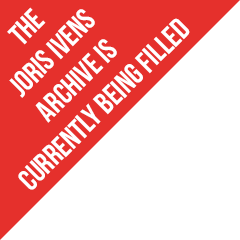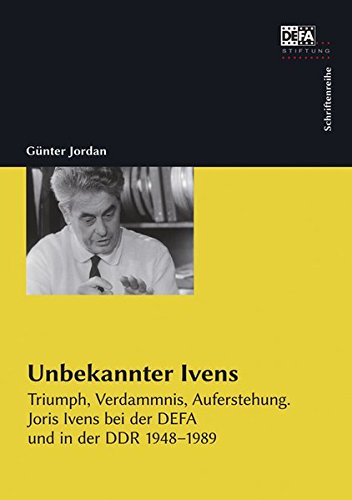

The long awaited book (in German) about Ivens and his East-German films, written by thé specialist in this field, Günter Jordan, has been published by the DEFA Foundation. This beautiful book describes in 680 pages the triumph in the 1950’s, the condemnation at the end of the 1960’s when Ivens became persona non grata in the GDR, until the resurrection of Ivens’ DEFA-films.
On 9 April the book Unbekannter Ivens: Triumph, Verdammnis, Auferstehung. Joris Ivens bei der DEFA und in der DDR 1948-1989 will be presented at the Kino Arsenal film theatre in Potsdam. This presentation will be accompanied by a film programme starting at 7 PM with the documentaries Er filmte auf Fünf Kontinente (Joachim Hadaschik, 1963, 23 min.) and Die Windsbraut (Daniela Schulz, 1998) and at 9 PM with the feature film Till Eulenspiegel (Gérard Philipe, Joris Ivens, 1956).
This book is published in conjunction of a new DVD with three major Ivensfilms made for DEFA, which have been analysed by Jordan.
A balanced and impressive analysis
Günter Jordan already published many books about the history of the DEFA, the famous East-German film studio’s in Babelsberg near Berlin and a painstaking precise and bulky study about the ‘state film apparatus’ in the GDR with all its labyrinthine, bureaucratic levels. Jordan accumulates the qualities of a solid, very accurate filmscholar without prejudices, with the qualities of a hands-on professional, because he also worked as a filmmaker and director himself. He created various film productions for the DEFA film studios, and has experienced himself from the inside how the ‘system’ functioned in the East-German film industry. He knows the persons involved and succeeded in getting access to documents who nobody has seen before because of their secrecy. His in-depth study resulted in a balanced and impressive analysis of Ivens’ film career in the GDR, which has been written with flair and humour.
Rejection and appreciation
Why were the films Ivens made for the DEFA filmstudios up till this publication ‘unknown’, the least shown, the least researched or even the least appreciated? Did Ivens reject his East-German films himself? During the 1980’s he prohibited screening of certain films he made in the GDR, because he felt these films could cause him political trouble. Some were even labelled Stalinist. On the other hand he stated that his most rejected and less successful films were the most deer to him, similar to what a parent would feel for a prodigal child. In this sense he never rejected these films.
'Unknown'?
It is not true that these films were not studied or shown, as Jordan states in his book. They were not 'unknown', a label of which Jordan himself writes: 'ist einerseits Nonsens' (page 10) . Indeed it is on the one hand not true: these films were studied by well known film scholars like Raymond Borde, Thomas Waugh, Charles Musser, Jordan himself and others who published their eloquent and insightful analysis of various DEFA films since decades, among others in a number of publications of the Ivens Foundation (USA-catalogue and Ivens Magazine. The films were part of various retrospectives. For instance Song of the Rivers, which was shown during the USA-and Canadian filmtour in 2002 and the retrospectives in Nijmegen. That these films were not part of the Joris Ivens DVD released in 2008, had to do with the copyright matter, owned by Ice Storm at the time, and its financial consequences. In the meanwhile, thanks to the concern of the DEFA Foundation, almost all Ivens' films made for the DEFA Filmstudios, are available for the public.
On the other hand: nobody studied this period that thorough, comprehensive and profound, with so much coherence, integrating all aspects of Ivens and the GDR, like Jordan did. His clear analysis unveils much, and clarifies a lot which was not know until this book. That makes this book a real addition with added value to existing Ivens studies and literature.
The reception of Ivens DEFA films
The troubled reception of this period certainly didn’t have to do with the appreciation at the time these films were released. On the contrary, these films received many awards and met Millions of spectators in the Communist world, which at that time covered a large part of the globe with the Soviet-Union, China, the Eastern-Block, Western-European countries with strong left wing parties and a lot of Third World countries fighting for independence against neo-colonial oppression. Song of the Rivers (Lied der Ströme, 1954) for instance must have been seen by some 250 Million spectators around the world, according to impressive figures of the commissioners themselves.
Also Ivens himself was awarded within the context of this system and became a leading figure in the film production. However as soon as he broke with the political line of the Soviet-Union and embraced the Chinese political policies, which became apparent when he supported the Prague Spring in 1968, he became persona non grata in the GDR, never to enter the GDR anymore.
A for Ivens unexpected homage to the Prince William of Orange as protagonist in the feature film Till Eulenspiegel (1956), an international co-production of DEFA and Ariane.
When Ivens started to work for the Berlin based DEFA filmstudios in 1951 his documentary style had already taken shape. He was no longer the avant-garde pioneer of the 1920’s and 1930’s. Documentary film and documentary filmmakers had conquered in only a few decades a fundamental position within the cultural landscape. Mostly because documentary film was increasingly used by governments for educational and propagandistic purposes during the Second World War and the years of reconstruction.
The classic documentary style with not-synchronic sound, well composed pictures and lighting, the ‘voice-of-God’-voice over and objective camera techniques is characteristic for this period, avoiding experiments and confusing modes of interpretation and imagination. Ivens used a broad spectrum of -even opposing- film modes ranging from film poetry, newsreel, reportage, compilation film, re-enactment up to even feature film. This wide range of styles makes this period as interesting as all other periods in Ivens’ career. Soon the generation of the 1960’s took over and made this film style suspected, irrelevant and outdated, using themselves new hand-held cameras with direct sound. Also Ivens himself changed his film style in this way, not only due to new film technology, but also as a reaction on television.
This new aesthetical paradigm of documentary film as direct cinema is probably the main reason why the East-German period of Ivens was for a long time neglected.
Nowadays a new appreciation of various artistic developments during the 1950’s makes a more balanced judgement possible.
Günter Jordan ( 1941), studied Slavonic languages, History and Educational Theory, Teaching, Film direction at the Deutschen Hochschule für Filmkunst Potsdam-Babelsberg. He was documentary filmmaker and director himself at the DEFA-Studio für Dokumentarfilme, and freelance filmmaker from 1992. He gained his PhD in 1990 from the Humboldt-University Berlin with a dissertation about the early DEFA documentary film and the DEFA weekly newsreels Der Augenzeuge (Eyewitness). He published in magazines (Sonntag, Film und Fernsehen, BFF), Close Up (Konstanz), Ivens-Magazine (Nijmegen), in the annuals of the DEFA Foundation (Berlin 2000–2005) and in ‘Bilder einer gespaltenen Welt’ (Berlin 2007); ‘Alltag des Dokumentarfilms 1946-1950’ (Berlin 1987); ‘Erprobung eines Genres. DEFA-Dokumentarfilme für Kinder 1975-1990’ (Remscheid 1991), ‘Sie sehen selbst, Sie hören selbst ...‹ Die DEFA von ihren Anfängen bis 1949’ (with Christiane Mückenberger, Marburg 1994), ‘Schwarzweiß und Farbe. DEFA-Dokumentarfilme 1946-1992« (with Ralf Schenk, Berlin 1996, 2000), ‘Film in der DDR. Daten Fakten Strukturen’ (Potsdam 2009, 2013). ‘Zu den Anfängen zurück, um weiterzukommen. Die Geburt des neuen DEFA-Dokumentarfilms’, in: Klaus Stanjek (Hg.): ‘Die Babelsberger Schule des Dokumentarfilms’, Berlin 2012.
For the book ‘Unbekannter Ivens. Triumph, Verdammnis, Auferstehung 1948–1989’ Günter Jordan did research in the Joris Ivens Arhives and many other in Berlin, Paris and elsewhere.
See for more information: Bertz+Fischer Verlag:
http://www.bertz-fischer.de/unbekannterivens.html
